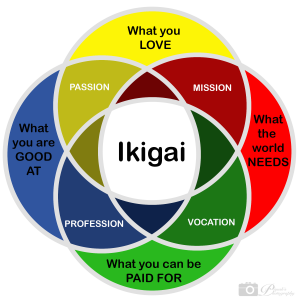Ikigai - popular yet widely misunderstood
Ikigai, is a Japanese concept made of two words, iki=>life and gai=>worth/purpose. It is about finding what makes your life worth living. In other words it could be explained simply as the reason that would make you get out of your bed every morning.
It is not about what the world needs from you or what you could be paid for. That is the westernized and commonly misunderstood representation of ikigai. For Japanese people, ikigai is a way of living and they don’t typically refer to any framework when asked about their ikigai.
Westernization of the concept:
It all started back in 2014, when Marc Winn wrote a blog titled – “What is your Ikigai?” and visualized it with following venn diagram.

The venn diagram represented that there are four components which need to fulfilled to achieve your ikigai. The four components are
- What is that you love?
- What is it that you are good at?
- What is it that you will be paid for?
- What is that the world needs?
Although, the diagram and the questions look very compelling and intriguing, Marc himself in a later post (almost 3 years later) clarified that he merged two different concepts in his 2014 post to create something new. He said he merged the “Purpose” venn diagram with ikigai after he heard Dan Buettner’s ted talk. He just replaced the word “Purpose” with “Ikigai” in the new diagram.
What’s the misunderstanding here?
Well, the biggest misconception here is one can achieve ikigai if all the four components are met or in other words to achieve your ikigai you will have to fulfil all the 4 constraints. That said, if you are doing something that you are good at but no one pays for it, you can’t achieve your ikigai is a false notion.
Another challenge in using this diagram to find your ikigai is that it presents ikigai as a daunting task to pursue.
Why is this framework so popular then?
Even though the framework is a misinterpretation of ikigai concept, it still created positive impact for thousands of people. The framework has been used by people across the globe to determine their purpose for life.
In Marc’s own words –
“The volume of work around it has risen exponentially since 2014. It keeps on growing, without any extra input or energy from me. I have no control over it. People keep adapting and editing the idea in new directions, so there are different variants out there, being shared, as well. Literally tens (maybe hundreds) of millions of people have seen it, and thousands and thousands of people have let it influence their life in some way.”
And since the framework was able to nudge people to find their purpose or influence their lives in some way, it gained all the popularity.
OK, but how do I find my ikigai?
The easy answer – get started with the framework itself.
The difficult answer –
Ikigai is not about making money or creating what the world needs. It is about introspecting and exploring what gives meaning to your life, what makes it purposeful, what makes it worth living.
Ken Mogi, neuroscientist and author of the book,
The Little Book of Ikigai: The Essential Japanese Way to Finding Purpose in Life, explains, ikigai is about discovering, defining and appreciating those pleasures of life which have meaning to you.
He further also explains, that ikigai is a spectrum. On one side it could be as simple as the reason you get up in the morning; sipping a cup of tea with a friend. On the other side it could be a life defining goal. Ken also says that ikigai is not a fixed notion, it can change as you grow and gain experiences. And you can have more than one ikigai.
To start exploring your ikigai, start small. Find what gives joy in day to day activities. Make that joy, build your habits, build your routines. While you do that be present in the moment and relish it. And soon you would be on your way to discover what your own ikigai is, what gives purpose and meaning to your life.
Have you found your Ikigai?


